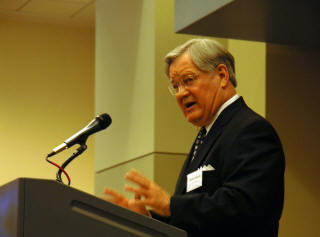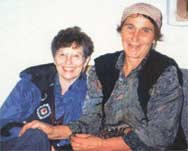|
Vol. 5 No. 8
|
|
|
|
|
|
The Jesse Mercer Plaza
Mercer University, Macon Campus |
 |
|
|
Produced by The Center for Baptist
Studies, Mercer University
A Monthly EMagazine, Bridging Baptists
Yesterday and Today
Walter B. Shurden, Executive Editor, The
Baptist Studies Bulletin
Bruce T. Gourley, Editor, The
Baptist Studies Bulletin
Wil Platt, Associate Editor, The Baptist Studies
Bulletin
|
|
Visit The Center for Baptist
Studies' Web Site at www.centerforbaptiststudies.org
|
|
Table of
Contents
|
TABLE OF CONTENTS
I Believe . . .
: Walter B. Shurden
"The
Quivering of the Foundations"
The Baptist Soapbox: Winnie Williams
"Addressing
the Injustices Heaped Upon Marginalized Women of the World"
Creative Ministries in the Local Baptist Church:
Lee McGlone
"Health
Ministries at FBC, Sioux Falls, South Dakota"
Baptists and Peacemaking:
Glen Stassen
"Start Talking"
Baptists, the Bible,
and the Poor: Charles E.
Poole
"Being
Kind to an Imperfect Church"
In Response To . . .
: Bruce T. Gourley
"In Response to . . . Billy Graham on the Mystery of
Salvation"
Dates to Note
We welcome your feedback.
Click here to tell us what you think of this
issue of the Bulletin!
Note: To print the BSB, set your printer's left
and right margins to .4 inches or less.
|
To
change / add / delete your email for the Baptist Studies Bulletin, please
click here.
|
|
Netscape users:
If
you need to increase the font size on your screen, click "view"
then "increase font."
|
Note: You are free
to duplicate and circulate the articles in BSB or to use quotations
from our articles. We would, however, appreciate a good word about where
you found your material. It makes us look good! Thanks.
|
|
I
Believe |
"The Quivering
of the Foundations"
By Walter B. Shurden
 I believe . . . I believe . . .
that the foundations beneath the right wing
religious/political zealots are quivering. Quivering, not shaking, not even
trembling, and certainly not crumbling! So don’t get your hopes up. But here
are signs of the quivering:
● Roy Moore, ousted
former Alabama Supreme Court Justice who transformed the Decalogue into a
political career, got his rock crushed by Governor Bob Riley in a recent
Alabama Republican primary election for governor. Riley, 66.66%; Moore, 33.34%!
● Former Christian
Coalition leader, Georgia Republican party chairman, and Jack Abramoff buddy Ralph Reed took it on the chin in his effort to win the Republican nomination
for lieutenant governor of Georgia. A Republican state senator beat him 56% to
44%!
● Frank Page’s first
ballot election as president of the Southern Baptist Convention should not be
interpreted as a swing back from theological extremes, but it is an
unequivocal signal that the fundamentalist SBC College of Cardinals that has
ruled the roost for a quarter of a century may no longer blow white smoke in
the face of that denomination in the future.
● E. J. Dionne, Jr.,
one of the finest minds and most gracious spirits among national newspaper
columnists today, asked in an op-ed piece in The Washington Post on 4
August something he confesses could not have been asked two years ago: “The
End of the Right?”
● The Pew Poll on social attitudes of Americans, released 3 August, ought to
give pause to the “theologians” in the Unites States Senate who pontificate on
“Americans believe this or Americans believe that . . . .” The press release
that accompanied the distribution of the Pew Polls said, “Americans cannot be
easily characterized as conservative or liberal on today’s most pressing
social questions. They are conservative in opposing gay marriage and gay
adoption, liberal in favoring embryonic stem cell research and a little of
both on abortion.”
Read the entire Pew Report.
● Friend William E.
Hull, who reads almost everything, pointed me to (Publishers Weekly,
May 22, 2006, p.52) an avalanche of new books critiquing right-wing Christian
involvement in politics. These books are literally piling up on us. If your
house is like mine, you have several of these stacked up, begging to be held
next. Here are eleven other titles to add to the “Three Books That Matter”
that I wrote about last month: Jim Wallis’s bestseller God’s Politics,
Obery Hendricks, Jr., The Politics of Jesus, Madeleine Albright, The
Mighty and the Almighty, Kevin Phillips, American Theocracy, John
C. Danforth, former Republican U. S. Senator from Missouri, Faith and
Politics, Rabbi Dan Cohn-Sherbok, The Politics of Apocalypse: The
History and Influence of Christian Zionism, George C. Hunter III,
Christian, Evangelical & . . . Democrat?, Gregory Boyd, The Myth of A
Christian Nation, Michale Lerner, The Left Hand of God, Robin
Meyers, Why the Christian Right is Wrong, Peter Laarman, editor,
Getting on Message: Challenging the Christian Right from the Heart of the
Gospel.
As a progressive
Baptist who believes the religious right wing is sincerely wrongheaded and as
a traditional Baptist who believes in the separation of religion and
government, I can only say, “Quiver, foundations, quiver!”
Table Of Contents
|
|
|
|
John Killinger's Latest Book:
 Seven
Things They Don't Seven
Things They Don't
Teach You in Seminary
1. “Churches are Really Institutions, Not Centers
of Spirituality”
2. “To Most Churches, Appearances Are More Important than Reality”
3. “Every Successful Minister is Drowning in a Sea of Minutiae”
4. “Pastoral Search Committees Seldom Know or Tell the Truth”
5. “Preaching to the Same Congregation Sunday after Sunday is
Extremely Hard Work”
6. “There is a Meanness in Some Church Members that is Simply
Incredible”
7. “The Calling to Be a Minister Transcends All the Problems that
Being a Minister Entails" |
| |
|
|
|
Hear John Kilinger at the
MERCER PREACHING
CONSULTATION 2006
September 24-26, St. Simons, Georgia |
 |
Main Presenter
- John Killinger
Featured Speaker - Fisher Humphreys
Music Leader - L.C. Lane
and many other great speakers!
View the Program here.
Limited Enrollment. The Consultation
sold out the
past two years.
Click here to register! |
|
|
Baptist
Soapbox
|
The Baptist Soapbox: Invited guests
speak up and out on things Baptist (therefore, the views expressed in this
space are not necessarily those of The Baptist Studies Bulletin, though
sometimes they are).
Climbing upon the Soapbox this month is Winnie
Williams. A retired professor from Southern Wesleyan University in South
Carolina and a frequent writer on missions and women's issues, Winnie has
traveled throughout the world, serving as educational consultant, university
teacher, speaker and humanitarian volunteer. Her website is
www.winniewilliams.com, and she
can be reached by email at
winnie@winniewilliams.com.
"Addressing
the Injustices Heaped Upon Marginalized Women of the World"
By Winnie Williams
 A piercing scream echoed from outside the third floor of an apartment building
where I was staying in Moscow as a guest of a Baptist minister and his family.
The screaming and pleadings came from a woman who was being beaten by a
middle-aged man, appparently her husband. Repeatedly, he struck her with his
fist as she thrashed about to avoid his punches and soon the blows to her head
caused blood to gush down her face. My Baptist host family rejected my plea
to call the police stating that this was a domestic incident and the police
would say, “We are too busy catching robbers and murderers to intervene in a
family matter.” The minister, in a blasé manner, said, “It is a domestic
problem, not a human problem.”
A piercing scream echoed from outside the third floor of an apartment building
where I was staying in Moscow as a guest of a Baptist minister and his family.
The screaming and pleadings came from a woman who was being beaten by a
middle-aged man, appparently her husband. Repeatedly, he struck her with his
fist as she thrashed about to avoid his punches and soon the blows to her head
caused blood to gush down her face. My Baptist host family rejected my plea
to call the police stating that this was a domestic incident and the police
would say, “We are too busy catching robbers and murderers to intervene in a
family matter.” The minister, in a blasé manner, said, “It is a domestic
problem, not a human problem.”
Each time I left the
building and stepped over the blood-soaked sidewalk, I felt a flood of anger
twisting in my chest. Finally the rains came and cleansed the ground, but not
my memory of this vulnerable Russian woman. I learned that such maltreatment
from their spouses
was rather typical for many Russian women. More than 10,000
Russian women are killed annually by a spouse or partner plus many, many more
suffer abuse.
Such violent behavior
toward women in patriarchal societies is typical, especially in developing
countries where the harsh realities of subjugation, rather than
love and justice, predominates. Violations of women’s civil rights became evident to me as I
became involved in volunteer missions and humanitarian endeavors in my travels
to more than 45 countries. I have grieved, been broken in spirit, distraught,
and even livid at the injustices heaped upon women such as beatings, rapes,
trafficking, and general degradation. I solemnly vowed to become
an advocate for these women as I believe they have been made in the image of
God to be loved, respected, and honored.
Many Baptists are
voiceless or deny the marginalization of women in America, much less on an
international dimension. Until we acknowledge the problems of patriarchal
control, it is difficult to address solutions to women’s subjugation.
The atrocious acts of
violence, neglect and exploitation directed at women produce shocking
statistics: only 10% of the world’s income is earned by women; of the
illiterate people in the world 66% are women; 200 million women are battered
annually; and 100 million women are disabled due to childbirth complications
resulting from poor health care. If the 20 million Baptists in the world addressed
this issue of human rights through redeeming love and justice for all God’s
children, the impact upon women would be incalculable.
Madeline Albright stated
that one of the major issues confronting the world this century is the
marginalization and abuse of women. Even though there has been some progress
in ensuring justice for women, the dilemma for millions of women is
ever-present. Often women turn to the church for solace but fail to find
empathy for their concerns. Is it not paradoxical that it is the church,
especially the fundamentalist prone groups, who impose stringent submission
requirements on women and use selected verses of the Bible as justification?
My observation is that the more fundamentalist a religious group is, the more
stringent is the imposition of submission.
It will take a
large slice of compassion, diligence, leadership and sacrifice by men and
women to effect change for women caught in impoverished and discouraging
circumstances. Are we to be the vessels that can enact change for these women
who need to be unshackled from their fetters? Perhaps our global
responsibility is to provide the touch that heals.
Photo: Winnie Williams, left, chats with a Kosovar woman
who lost seven members of her clan during the war.
Table Of Contents
|
|
|
|
|
Local Church |
Creative Ministries in
the Local Baptist Church:
This series highlights local churches who are
intentionally creative in their approach to ministry. This month's
featured local church ministry emphasis focuses on the Health Ministries of First Baptist Church,
Sioux Falls, South Dakota.
Senior Pastor Lee McGlone discusses the impact of
this ministry within First Baptist and the Sioux Falls community.
"Health
Ministries at FBC, Sioux Falls, South Dakota"
By Lee McGlone

At FBC in Sioux Falls, SD, we believe there is a
relationship between health care and spiritual care. In the New Testament,
large portions of Jesus’ teachings are devoted to healing narratives—and the
resultant discussions that followed them. The disciples were sent out not
only to preach the gospel but to heal the sick (Luke 9:2). Jesus promised
that we would do even greater work than he (John 14:12). In the Book of Acts,
the early church gave attention to care-giving for the people most neglected
in society. We think we should do the same.
Soon after my arrival
here in 2002, discussion about health ministries began. By the next year, a
number of key lay leaders and our Pastor for Caring Ministries formed a group
that helped to explore the vision. As we worked patiently through the
appropriate decision-making channels, we quickly discovered significant
support for the concept and the readiness to develop a staff position to give
leadership to it. In early 2004, a “Health Ministries Team” was developed and
a part-time position of “Parish Nurse” was budgeted.
The Health Ministries
Team, composed of interested and committed lay persons along with one
physician and several nurses, gives guidance and accountability to the
ministry. The group meets regularly to assess the vision, to evaluate
ministries, and to make plans for the future.
The Parish Nurse is a
professional who serves 20 hours a week on our staff and serves as the liaison
to the Health Team. A Parish Nurse is described as
“a registered nurse who has answered a call
from God to be an advocate of physical, emotional and spiritual wellness
within the church. A parish nurse has obtained additional training that
prepares one to provide holistic health care. The focus is on wellness and
disease prevention rather than hands-on physical care. Parish nurses do not
duplicate or compete with existing service providers. They work
collaboratively with community services and resources to enhance health care
delivery.”
Here in Sioux Falls, health ministries function in a
number of capacities: counseling and listening to concerns of members,
providing referrals to agencies in the community for health needs, designing
educational programs that promote health awareness issues, regularly staffing
screenings for hypertension, cholesterol, diabetes, etc., and facilitating
support groups that relate to physical, emotional, and/or spiritual health. In
short, health ministries seek to encourage and to model the balance of
wellness in body, mind, and spirit.
Some of the
highlights of our efforts in recent months include:
Ø
numerous small-group seminars on
end of life issues,
Ø
regular blood pressure screenings
on Sunday mornings,
Ø
providing flu shots for the
elderly,
Ø
communication about health issues
in church publications,
Ø
discussions about Medicare options,
Ø
hospital contacts and follow-up
home visits.
In addition, Sunday morning small-group options on topics ranging from grief
recovery to family living will be offered, beginning in September. A unique
event is a monthly Sunday afternoon “healing service” that invites persons
with personal, spiritual, and/or physical needs to attend for prayer and
support.
I give thanks for this newly designed ministry. It has
made a positive impact on the many who have received caring support from
it—and also on those who have discovered a unique way to invest their medical
and care-giving training in the work of the Lord’s church. I look forward to
its continued growth and development.
(Visit
Health Ministries online.)
Table Of Contents |
|
|
“NEGOTIATING CONFLICT
IN THE CONGREGATION”
McAfee Institute for Healthy
Congregations,
McAfee School of Theology,
Center For Baptist Studies and
Cooperative Baptist Fellowship of Georgia
October 26, 2006 @ Religious Life Center,
Mercer University,
Macon, Georgia
Begins at 9:30 AM, Concludes at 3:30 PM
Featuring: Dr.
Dennis Burton, Workshop Leader
For more information and to
register, contact Dr. Larry McSwain. |
Baptists
and
Peace-
Making |
Baptists and Peacemaking:
A noted theologian and ethicist, Glen
Stassen is the Lewis B. Smedes Professor of Christian Ethics at Fuller
Theological Seminary in Pasadena, California. Prior to his current
position, he taught at Southern Baptist Theological Seminary for 20 years.
He has been a visiting scholar at Harvard University, Duke University and
Columbia University.
"Start Talking"
By Glen Stassen

Baptists and
what Jim McClendon calls small-b-baptists (believers' church members) are all
baptized as believers into the death, burial, and resurrection of Jesus
Christ. This tends to make us Christ-centered. We see baptism as dying to sin
and being raised to live in Christ (Romans 6). Not that we never sin anymore,
and not that we follow Jesus always, but it is the shape of our commitment.
Many forces
dilute this commitment. We baptize many children so early that they are not
ready to make this commitment. Some churches preach praise and celebration
without a thick and deep commitment to following Jesus. Political forces
infiltrate churches so they will follow their ideology rather than Jesus, or
will confuse the two. Many Baptists are not aware of our historical identity
from the Puritans, the Anabaptists, and the revivals.
But still we
know that God's grace comes in and through Jesus Christ, and calls us to live
in Christ, to follow Jesus.
So I've been
working for a long time to help recover our sense of identity, to recover our
historical origins, to recover an ethic that understands discipleship as following
Jesus with full seriousness, and to think through what that means. I've been
working at recovering the Sermon on the Mount for Christian living: It is not
"high ideals" or "hard teachings" or "antitheses," but realistic ways of
deliverance from the vicious cycles that we get stuck in. I just published a
new book for good, ordinary people and good church study groups called
Living the Sermon on the Mount: A Practical Hope for Grace and Deliverance
(Jossey-Bass).
For now I
want to focus on Jesus' teaching that if we are angry at someone, we are
commanded to drop everything and go make peace with that someone (Matthew
5:21-26). It was W.W. Adams at Southern Seminary who first opened this
teaching up to me—emphasizing that this is a command from Jesus, not some weak
ideal for when we feel our enemy is good enough and our mood also is good
enough. Jesus says, "Just do it." It's a command.
This led me
to bring together Christian ethicists from various denominations to
collectively
develop the new paradigm for the Christian ethics of peace and war called Just
Peacemaking. (It's explained in two books I've published by that title,
Just Peacemaking).
The just
peacemaking practice that implements Jesus' teaching in Matthew 5:21-26 is
"cooperative conflict resolution." You go talk with your enemy and practice
conflict resolution.
Is it true
that as Baptists we are committed to live in Christ, to follow Jesus?
Is it true
that Jesus commands us to go make peace with the one we are angry with?
Then doesn't
this
mean that we should be pushing our government to go and talk with its enemies
and try to resolve conflicts and avoid war? War kills and destroys, as we see
in Lebanon these days.
Shouldn't a
political leader who claims to be a Christian support this practice of just
peacemaking?
Today's New
York Times editorial (August 8) is titled, "Start Talking." It says: "When asked
why the US isn't talking with Syria to persuade it to stop supplying missiles
to Hezbollah, President Bush replied, 'Syria knows what we think.'" But that
doesn't listen to what Syria wants and to what will induce it to cut off
shipments of rockets to Hezbollah or accept international monitors on its
border. "Mr. Bush has always seen talking as a reward." He has refused to talk
with Syria, Iran, North Korea, and a Palestine that democratically elected Hamas. That has failed to stop Syria's sending missiles to Hezbollah, Iran's
enriching uranium, North Korea's building nuclear weapons and missiles, or
Palestinian kidnapping of an Israeli soldier.
Jesus doesn't
see talking as a reward. It is a command. And it works a whole lot better to
deliver us from these vicious cycles of nuclear weapons buildups, missile
launches, and wars. Who's the realist?
Table Of Contents |
|
|
"Church and State in the 2006 Elections"
 A Morning with J. Brent Walker of the Baptist Joint Committee on Religious Liberty A Morning with J. Brent Walker of the Baptist Joint Committee on Religious Liberty
Religious Life Center, Mercer University, Macon, GA
7 September 2006
Sponsored by The Center For Baptist Studies, Mercer University and
the Cooperative Baptist Fellowship of Georgia
The Conference is Free and is open to the public.
|
|
Baptists
Bible and Poor
|
Baptists, the Bible, and the Poor: Charles E. Poole is a Baptist minister with Lifeshare
Community Ministries in Jackson, Mississippi where he delights in
ministering alongside the poor. "Chuck" Poole, a provocative
preacher and servant pastor, served Baptist churches for twenty-five years. Among
the churches he has served are First Baptist Church, Macon, GA, First Baptist
Church, Washington, DC, and Northminster Baptist Church, Jackson, MS.
"Being Kind to an Imperfect
Church"
By Charles E. Poole

In the religious world of my youth, “worldly music” was not looked upon with
favor, which is why I kept my Three Dog Night albums inside a Wendy
Bagwell and the Sunlighters Greatest Gospel Hits album cover.
One of Three Dog
Night’s biggest numbers was a misty-eyed, hand-holding ballad called “Easy
to be Hard,” a phrase that often comes to my mind when I think about Baptists,
the Bible and the poor. When it comes to Baptists, the Bible and the poor, the
subject eventually works its way around to money and how the church spends it.
It is at that point that it is often easy to be hard on the church. You know
how this goes: 1) The church is the body of Christ and Christ is the head of
the church. 2) That means the church is in the world to embody the teachings
of Christ. 3) Or, more simply put, the church is in the world to do what Jesus
would do if Jesus were here. And it's along about there, somewhere around
number three, that it becomes easy to be hard on the church, because the
church is caught in a culture that demands things Jesus might not bless if he
were here. Jesus called us to unclutter our lives, reduce our possessions,
“sell all we own and give the proceeds to the poor.” So as long as churches
continue to acquire, obtain, build and expand, its easy to be hard on the
church for failing to follow the church’s Lord. The contradictions are obvious
and abundant, making the church an easy target.
But it isn’t that simple.
Inside the spaces that churches spend millions to build, good things happen.
Inside those spaces, lives are formed and minds are transformed. Here is a
real irony: Would Jesus want churches to spend so much on their own comfort
and convenience? No. But do very good things happen in those spaces Jesus
would not have voted to buy? Yes.
So, let’s be kind to the
church. After all, if the Jesus of the gospels is her Lord, she has an
impossible standard to live up to. So, of course, it will always be easy to be
hard on the church. But the church, even with all its ironies and paradoxes
and contradictions, is the best we have. In fact, it’s all we have.
So, three cheers for the
church! Thanks be to God for the church.
Table Of Contents |
|
In
Response To ...
|
"In Response to . . . Billy Graham on the Mystery of
Salvation"
By Bruce T. Gourley

They both grew up in the South, and for much of their lives both have been
Southern Baptists. Both have studied the Bible extensively, yet both preach a
Gospel which is foreign to today’s Southern Baptist leaders. One is well
known within Baptist academic circles, the other is one of the most
recognizable world figures of the late 20th and early 21st
centuries.
“Our faith does not
require that we believe that God permits no knowledge of God except through
Jesus,” one says. “We should not ever try to limit how God can speak. God
acts creatively and redemptively in the world. We should let God draw the
boundaries of creation, judgment and redemption …. God will never abandon ….
God will never close the door …. God’s love will prevail.”
“Those are decisions only
the Lord will make,” echoes the other, addressing the issue of whether heaven
is closed to Jews, Muslims, Buddhists, Hindus and other non-Christians.
“It would be foolish for me to speculate about all that. I believe the
love of God is absolute. He said he gave his son for the whole world, and I
think he loves everybody regardless of what label they have.”
Yet despite their shared
view that salvation exists beyond Christendom, one of the two is dismissed as
a heretic by fundamentalist Baptists, while the other is embraced as a hero.
After decades of opposing Kirby Godsey, fundamentalist leaders of the Georgia
Baptist Convention purified themselves from any association with Godsey’s “liberal” beliefs by defunding Mercer University in the fall of
2005. The same year, after decades of claiming evangelist Billy Graham as one
of their own, fundamentalist leaders of the Southern Baptist Convention led
their constituency to vote to commission a huge statue in Graham’s honor. “There
is no better-known name in the entire world, when it comes to being a person
of faith, than Billy Graham,” SBC president Bobby
Welch proclaimed of the evangelist for which Southern Baptist Theological
Seminary
named a school.
It is seemingly bizarre that two well known Baptists who publicly acknowledge
salvation beyond Christendom are treated so differently by fundamentalists.
The story of how Godsey (the author of the first quotation in this article,
published in his 1996 volume, When We Talk About God … Let’s Be Honest)
became a heretic and Graham (the author of the second quotation, in
the August 14, 2006 edition of Newsweek)
became a hero is a reflection of how a once dynamic and growing denomination
has been transformed into a declining, culturally-bound, politically-captive
and increasingly irrelevant body. In light of decades of failed evangelistic
and baptismal efforts, the Southern Baptist Convention needs the name, if not
the theology, of the world’s greatest evangelist. When the statue of Graham
was unveiled in June 2006 at the annual SBC meeting, Southern Baptist leaders
applauded his “evangelistic fervor,” “impassioned preaching style,” and
“innovative use” of media, but were noticeably silent regarding Graham’s
theology. In the Newsweek interview Graham expressed regret for not
pursuing graduate education. Yet if the world’s greatest evangelist had
pursued an academic career instead of holding revivals in stadiums worldwide,
he would not have been honored by a convention which despises open scholarly
inquiry and scoffs at honest reflection upon the mysteries of God.
Billy Graham recognizes,
now more than ever, the inclusive nature of God’s love and the freedom that is
the very heart of the Gospel he has faithfully preached to hundreds of
millions of persons over six decades. Moderate Baptists would do well to
learn from his evangelistic fervor; fundamentalist Baptists would do well to
learn from his inclusive theology.
Visit Bruce's personal
website.
Table Of Contents
|
|
|
Recommended Online Reading
for Informed Baptists
Compiled by Bruce Gourley
Will This be the Next Major Higher Education Case to Reach the Supreme Court?
Inside Higher Education
Lawyers are squaring off over the issue of whether state universities are
required to recognize, and thus provide tax-payer funding, for student
organizations whose membership requirements are based solely on religious
beliefs.
Is the "Heyday of the Christian Right" Over?
Margaret Carlson of Bloomberg News
In the wake of Ralph Reed's defeat in the Georgia Republican primary,
Carlson went in search of answers regarding the larger impact upon the
Religious Right. Along the way she visited David Dockery who pointed her
to Frank Page's defeat of Ronnie Floyd and Jerry Sutton for the SBC
presidency. In the end, she concludes that the post-Bush era will not be
kind to the Religious Right.
John
Hagee, Bush's Top Middle East Advisor?
Max Blumenthal of The Nation
In shaping its Middle East policies, in recent months the Bush
administration has been secretly meeting with Christians United for Israel.
CUFI is advising the administration of the "biblical imperative" to stand
firmly with Israel and to be more confrontational with Iran. None other
than end-times architect John Hagee is the founder of CUFI. |
|
Dates to
Note
|
Dates to Note
September 7, 2006,
Conference on “Church and State in the 2006 Elections,"
Mercer
University,
Macon, Georgia.
A morning with J. Brent Walker of the Baptist Joint Committee on Religious
Liberty.
Click here for more information.
September 24-26, 2006, The Mercer Preaching
Consultation, St. Simon's Island, GA. Sponsored by the McAfee School of
Theology and The Center for Baptist Studies. Headline speaker: John
Killinger.
Click here for more information.
October 2-3, 2006, A Theological Discussion, "A
Theology of Ministerial Leadership," featuring William E. Hull and David W.
Hull. Knoxville, Tennessee.
Click here for more information.
October 8-10, 2006, Candler School of Theology
Fall Conference, "Faith, Politics, and Policy."
Click here for more information.
October 12-13, 2006, Conference on Ethics in
Ministry, "How to Be a Good Minister," featuring Tony Campolo. McAfee
School of Theology, Atlanta, Georgia.
Click here for more information.
October 26, 2006, Negotiating Conflict in the
Congregation, Religious Life Center, Mercer University, Macon, GA.
Sponsored by McAfee Institute for
Healthy Congregations, McAfee School of Theology, The Center For Baptist
Studies and Cooperative Baptist Fellowship of Georgia. To register, mail
to Dr. Larry McSwain, McAfee School of Theology, 3001 Mercer University Drive,
Atlanta, GA 30341-4115 a check payable to McAfee School of Theology in the
amount of $39 by October 20, 2006. Registration at the door: $49.
November 5-6, 2006, CBF/GA Fall Convocation, "A
Gift Too Good to Keep!" First Baptist Church of Christ of Macon.
Speakers: Rob Nash, CBF National Global Mission Coordinator, and Bill
Underwood, Mercer University President. For more information, visit
www.cbfga.org.
December 29, 2006 - January 2, 2007, Antiphony,
"Call and Response." Hyatt Regency, Atlanta, Georgia. For more
information, visit
www.antiphonyonline.org.
February 7-10, 2007, Current Retreat, "Let
Justice Roll." First Baptist Church, Austin, Texas. Registration cost is
$100 for ministers and lay leaders, $55 for seminary students.
Click here for more information.
February 19-20, 2007, Self Preaching Lectures,
McAfee School of Theology, Atlanta, Georgia. Speaker: Tom Long.
For more information, email
Diane Frazier.
For a full calendar of Baptist events, visit the
Online Baptist Community Calendar.
Table Of Contents
|
|
|
|
|
|
If
you do not wish to receive BSB any longer, please
Click Here to unsubscribe.
|

 I believe . . .
I believe . . . Seven
Things They Don't
Seven
Things They Don't
 A piercing scream echoed from outside the third floor of an apartment building
where I was staying in Moscow as a guest of a Baptist minister and his family.
The screaming and pleadings came from a woman who was being beaten by a
middle-aged man, appparently her husband. Repeatedly, he struck her with his
fist as she thrashed about to avoid his punches and soon the blows to her head
caused blood to gush down her face. My Baptist host family rejected my plea
to call the police stating that this was a domestic incident and the police
would say, “We are too busy catching robbers and murderers to intervene in a
family matter.” The minister, in a blasé manner, said, “It is a domestic
problem, not a human problem.”
A piercing scream echoed from outside the third floor of an apartment building
where I was staying in Moscow as a guest of a Baptist minister and his family.
The screaming and pleadings came from a woman who was being beaten by a
middle-aged man, appparently her husband. Repeatedly, he struck her with his
fist as she thrashed about to avoid his punches and soon the blows to her head
caused blood to gush down her face. My Baptist host family rejected my plea
to call the police stating that this was a domestic incident and the police
would say, “We are too busy catching robbers and murderers to intervene in a
family matter.” The minister, in a blasé manner, said, “It is a domestic
problem, not a human problem.”



